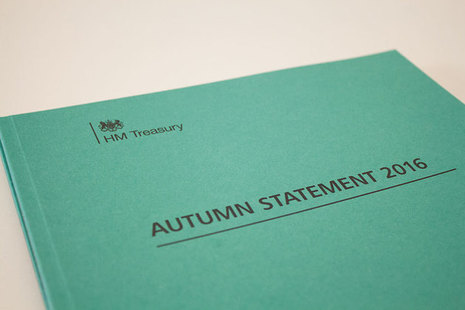
In his first Autumn Statement as Chancellor of the Exchequer, Philip Hammond provided no big surprises in his speech today, with a relatively low-key set of announcements aimed at preparing the UK for an uncertain future outside of the EU.
Whilst we didn’t believe there would be wholesale changes affecting pensions, we were glad to see little to report following a period of huge upheaval.
The headlines are:
Fiscal Forecasts
The Chancellor revealed revised forecasts from the Office for Budget Responsibility (OBR), including:
Growth in GDP
Expectations are for positive growth in GDP, although lower than previously forecast:
Overall, growth over this period is 2.4% lower than it would have been, due to the effects of Brexit. The Guardian newspaper highlighted that this is equivalent to £58.7 Bn as a result of the vote to leave the EU.
Budget Deficit
As expected, George Osborne’s target for zero deficit in this Parliament has been abandoned, the new Chancellor said that his target is for it to reach zero “as early as possible” in the next one.
As a share of GDP, these figures are estimated to peak at 90.2% in 2017/18 and then to fall thereafter, the first reduction in these terms since 2001.
Spending
There were lots of spending announcements, focussed largely on physical, transport and digital infrastructure, aimed at preparing the economy for leaving the EU. There was also an announcement of funding for an additional 40,000 affordable homes.
Income Tax
There will be no change to what had already been announced in terms of income tax thresholds/allowances and rates.
The personal allowance will rise from £11,000 to £11,500 in April 2017, it was also confirmed there would be an increase in the personal allowance to £12,500 and the higher rate tax threshold to £50,000 by the end of this Parliament, with future increases suggested to be inflation linked.
National Insurance Contributions (NICs)
The thresholds for employee and employer NICs will be aligned, this will make no difference to employee rates but will mean that employers will pay up to £7.18 per annum more per employee (in 2017/18).
Corporation Tax
There will be no change to what has been previously announced; we were reminded that the rate of corporation tax had fallen from 28% to 20% since 2010 and that this will continue to be reduced in stages to 17% by 2020/21. These measures are likely to make the UK attractive from an investment and business point of view.
Capital Gains Tax
No changes were announced.
Salary Sacrifice
The benefits will be removed with effect from April 2017; ultra-low emission cars, pensions saving, childcare and the cycle to work scheme will be excluded from this change.
Pensions
As was widely expected, there will be a consultation on the best way to tackle cold calling, following the fantastic efforts of Darren Cooke of Red Circle Financial Planning who launched an e-petition calling for a ban just a few weeks ago, supported by a number of industry figures.
To combat fraud, there will also be strengthened powers for ceding pension schemes to refuse transfer requests. We await the details of the consultation.
Money Purchase Annual Allowance
The Government is consulting on its intention to slash the MPAA from £10,000 to £4,000 from April 2017.
According to the paper released today, the total cost of tax and NI reliefs on pension contributions is now £48 Bn ; tax receipts from pension payments only amounts to £13 Bn, a significant net overall cost to the UK taxpayer. Furthermore, only 3% of those aged over 55 pay more than the proposed £4,000 MPAA and 2/3rds of the total cost of tax and NI relief goes to higher and upper rate taxpayers.
The consultation paper proposes a figure of £4,000 as the Government does not want to adversely impact auto-enrolment nor impede genuine instances of people needing to rebuild their pension savings, such as those divorced/separated or those who have been made bankrupt ; the reduction is aimed at those who may be obtaining double tax relief by recycling payments.
The consultation runs to Wednesday 15th February 2017.
Fuel Duty
There will be another freeze on fuel duty, the seventh in a row. The Chancellor said this would typically save a car driver £130 ; van drivers might save £350. This will offset some of the concerns about rising fuel prices, due to the fall in the value of the pound relative to the US dollar.
Insurance Premium Tax
This will increase from 10% to 12% in June 2017. Note that this applies to most general insurances such as car, house, medical and pet but not to travel insurance (which has its own 20% rate).
Letting fees
The law in England will be changed as soon as possible to prevent letting agents from charging tenants. Although this is aimed at helping the 4.3 million people who rent properties, there is a view that this may end up being passed on to tenants in the form of increased rents.
Future Budgets
This was the last Autumn Statement, next year there will be the usual Spring Budget followed by an Autumn Budget. From 2018 there will be a Spring Statement and an Autumn Budget, with fiscal changes being announced once a year, in the Budget. The purpose of Spring Statements will primarily be to hear and respond to reports from the Office for Budget Responsibility (OBR).
Links to various documents:
All documents: https://www.gov.uk/government/publications/autumn-statement-2016-documents
Autumn Statement: https://www.gov.uk/government/publications/autumn-statement-2016-documents/autumn-statement-2016
Consultation on Money Purchase Annual Allowance: https://www.gov.uk/government/consultations/reducing-the-money-purchase-annual-allowance
November 23rd, 2016